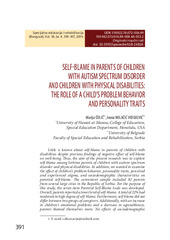Приказ основних података о документу
Self-blame in parents of children with autism spectrum disorder and children with physical disabilities: the role of a child’s problem behavior and personality traits
Samokrivica kod roditelja dece s poremećajem iz spektra autizma i motoričkim poremećajima: uloga detetovog problematičnog ponašanja i crta ličnosti
| dc.creator | Čolić, Marija | |
| dc.creator | Milačić-Vidojević, Ivona | |
| dc.date.accessioned | 2021-06-17T13:56:21Z | |
| dc.date.available | 2021-06-17T13:56:21Z | |
| dc.date.issued | 2019 | |
| dc.identifier.issn | 2406-1328 | |
| dc.identifier.issn | 1452-7367 | |
| dc.identifier.issn | 2406-1328 (eISSN) | |
| dc.identifier.uri | http://rfasper.fasper.bg.ac.rs/handle/123456789/3076 | |
| dc.description.abstract | Little is known about self-blame in parents of children with disabilities despite previous findings of negative effect of self-blame on well-being. Thus, the aim of the present research was to explore self-blame among Serbian parents of children with autism spectrum disorder and physical disabilities. In addition, we wanted to examine the effect of children’s problem behavior, personality traits, perceived and experienced stigma, and sociodemographic characteristics on parental self-blame. The convenient sample included 82 parents from several large cities in the Republic of Serbia. For the purpose of this study, the seven-item Parental Self-Blame Scale was developed. Overall, parents reported a lower level of self-blame. A total of 22% had moderate to high degree of self-blame. Furthermore, self-blame did not differ between two groups of caregivers. Additionally, with an increase in children’s emotional problems and a decrease in agreeableness, parents blamed themselves more. No effects of sociodemographic variables nor effects of perceived and experienced stigma on selfblame were found. Our results suggest that in supporting families of children with autism spectrum disorder and physical disabilities, clinicians need to take into consideration the variability in their experiences and that the Parental Self-Blame Scale could be used to identify the most vulnerable individuals. Additionally, support should also be provided to the child and thus decrease the child’s emotional problems and consequently support the whole family. | |
| dc.description.abstract | Uprkos prethodnim nalazima koji su pokazali negativan efekat samokrivice na blagostanje, malo se zna o prisustvu samokrivice kod roditelja dece s razvojnom ometenošću. Stoga je cilj ove studije bio da se ispita samokrivica na uzorku roditelja dece s poremećajem iz spektra autizma i motoričkim poremećajima iz Srbije. Dodatno, želeli smo da istražimo efekat detetovog problematičnog ponašanja, crta ličnosti, opažene i doživljene stigme i sociodemografskih karakteristika na roditeljsku samokrivicu. Uzorak je uključio 82 roditelja iz nekoliko većih gradova. Za potrebe ove studije konstruisali smo Skalu roditeljske samokrivice, koja se sastoji od sedam stavki. Generalno roditelji su izvestili o nižem stepenu samokrivice, mada je 22% imalo umeren i visok stepen. Nije dobijena razlika u stepenu samokrivice u odnosu na dijagnozu deteta. Pokazano je da s porastom dečijih emocionalnih simptoma i opadanjem saradljivosti, roditelji više sebe okrivljuju. Sociodemografske karakteristike, opažena i doživljena stigma nisu imale efekat na samokrivicu. Naši rezultati ukazuju da kliničari treba da uzmu u obzir različitost roditeljskih iskustava i stepen samokrivice prilikom razvijanja programa podrške, te da se Skala roditeljske samokrivice može koristiti u identifikovanju ranjivih roditelja. Dodatno, podrška treba da bude usmerena i na dete, kako bi mu se pomoglo da ublaži emocionalne probleme, što će posledično pomoći celoj porodici. | |
| dc.language | en | |
| dc.publisher | Univerzitet u Beogradu – Fakultet za specijalnu edukaciju i rehabilitaciju/ University of Belgrade – Faculty of Special Education and Rehabilitation | |
| dc.rights | openAccess | |
| dc.rights.uri | https://creativecommons.org/licenses/by-sa/4.0/ | |
| dc.source | Specijalna edukacija i rehabilitacija | |
| dc.source | Specijalna edukacija i rehabilitacija | |
| dc.subject | autism spectrum disorder | |
| dc.subject | personality traits | |
| dc.subject | physical disabilities | |
| dc.subject | problem behavior | |
| dc.subject | self-blame | |
| dc.subject | stigma | |
| dc.subject | poremećaj iz spektra autizma | |
| dc.subject | crte ličnosti | |
| dc.subject | motorički poremećaji | |
| dc.subject | problematično ponašanje | |
| dc.subject | samokrivica | |
| dc.subject | stigma | |
| dc.title | Self-blame in parents of children with autism spectrum disorder and children with physical disabilities: the role of a child’s problem behavior and personality traits | en |
| dc.title | Samokrivica kod roditelja dece s poremećajem iz spektra autizma i motoričkim poremećajima: uloga detetovog problematičnog ponašanja i crta ličnosti | |
| dc.type | article | |
| dc.rights.license | BY-SA | |
| dc.citation.epage | 417 | |
| dc.citation.issue | 4 | |
| dc.citation.other | 18(4): 391-417 | |
| dc.citation.rank | M51 | |
| dc.citation.spage | 391 | |
| dc.citation.volume | 18 | |
| dc.identifier.doi | 10.5937/specedreh18-24824 | |
| dc.identifier.fulltext | http://rfasper.fasper.bg.ac.rs/bitstream/id/7934/1452-73671904391Q.pdf | |
| dc.type.version | publishedVersion |


